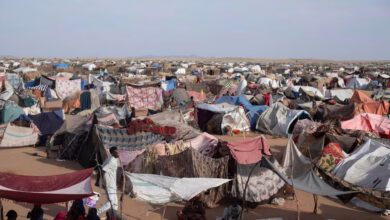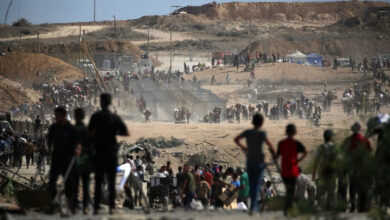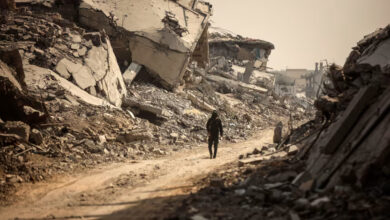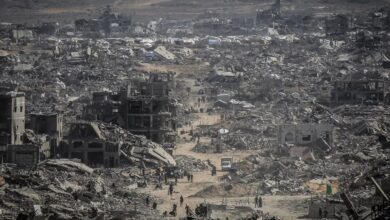Tripoli — Libya declared on Friday an immediate ceasefire in the month-long battle against rebels fighting to overthrow Muammer Qadhafi, which the insurgents swiftly dismissed as a bluff.
"Libya has decided an immediate ceasefire and an immediate halt to all military operations," Foreign Minister Mussa Kussa said as Western and Arab nations geared up to launch air strikes after the UN approved action to stop Kadhafi from crushing the insurgency.
Meeting on Thursday, the Security Council voted to permit "all necessary measures" to establish a no-fly zone, protect civilian areas and impose a ceasefire on Kadhafi's military.
Resolution 1973 "demands the immediate establishment of a ceasefire and a complete end to violence and all attacks against, and abuses of, civilians."
Kussa said Libya, as a member of the United Nations, was "obliged to accept the UN Security Council's resolutions."
But only hours earlier, Qadhafi told Portuguese television the council had "no mandate" for such a resolution, "which we absolutely do not recognise."
Two hours after the ceasefire was announced there was no confirmation that loyalist assaults on various rebel positions had stopped, but the insurgents' military commander accused Kadhafi of "bluffing."
Khalifa Heftir told journalists in the rebels' eastern bastion of Benghazi that "Qadhafi does not speak any truth… All the world knows that Muammer Qadhafi is a liar. He and his sons, and his family, and all those with him are liars."
Qadhafi "must surrender the weapons and himself to the Libyans, which would be better than to surrender to the foreign forces," said Heftir, an army defector.
US Secretary of State Hillary Clinton said Friday that Washington and its allies were still considering what would be "the most effective measures" to end the crisis.
And EU foreign policy chief Catherine Ashton said members of the 27-nation bloc were "looking at the details" of the ceasefire offer.
"On the military side, the critical questions will be for the military planners to work out what should be done. The issue of course is what's the significance of the statement on the ceasefire and how that fits in."
"Our view is that Qadhafi should go," she reiterated on behalf of the EU.
World oil prices fell in volatile trade after the ceasefire announcement.
Brent North Sea crude for delivery in May dropped US$3 before recovering to stand at US$114.15 a barrel in London afternoon trade, down 75 cents from Thursday.
Meanwhile, NATO said it would discuss Friday what role the alliance may take, and the Arab League said UN chief Ban Ki-moon will attend a high-level meeting of European Union, Arab League and African Union officials in Paris on Saturday.
So far Belgium, Britain, Canada, France, Italy, Norway, Spain, Sweden, Qatar and the United States have said they will help to enforce the no-fly zone.
French government spokesman Francois Baroin said Friday the strikes will come "rapidly…within a few hours."
The aim would be to "protect the Libyan people and to allow them to go all the way in their drive for freedom, which means bringing down the Qadhafi regime," he said.
British Prime Minister David Cameron told the House of Commons "we will deploy Tornado and Typhoon as well as air-to-air refuelling and surveillance aircraft. Preparations to deploy these have already started and in the coming hours they will move to airbases from where they can take the necessary action," he said.
Britain has an airbase on the eastern Mediterranean island of Cyprus and also has two frigates, HMS Cumberland and HMS Westminster, already in the Mediterranean.
There was no immediate indication of what might be targeted, but last week a source close to Nicolas Sarkozy said the French president was looking at Qadhafi's Bab al-Azizia command headquarters in Tripoli, a military air base in Sirte, east of Tripoli, and another in Sebha in the south.
Meanwhile, Libya denied reports it was shutting down its air space, but European governments decided to ban all civilian flights to the country, Europe's air traffic agency said.
Egypt also suspended all flights to Libya.
Earlier on Friday, rebels in Misrata, a bastion of the insurrection east of Tripoli, said Qadhafi's forces were pounding the city after a night of heavy gunfire.
"Dozens of bombs of all sorts have fallen on the city since last night," a spokesman told AFP, adding that the bombing was "still intense."
Clashes were also reported in the western towns of Nalut and Zintan.
The United Nations has estimated more than 1,000 people have been killed in the uprising.
In The Hague, the prosecutor of the International Criminal Court warned the Libyan government that any indiscriminate attack on civilians in Benghazi would constitute "war crimes."
"Any indiscriminate attack against civilians would constitute war crimes," Luis Moreno-Ocampo said. "The commanders will be responsible. As the prosecutor of the ICC, I will request an arrest warrant against them."
On 3 March, Moreno-Ocampo announced a probe into Qadhafi, three of his sons and key aides for crimes against humanity arising from the bloody crackdown. The probe could be expanded to include war crimes.
Announcing the ceasefire, Libya's foreign minister said Tripoli was encouraging the "opening of channels of dialogue with all parties," although he did not elaborate.
However, he said he "deeply regretted" the resolution, which he said would "aggravate the suffering of the Libyan people."
The people of Benghazi erupted with fireworks and joyful gunfire after news spread of the UN resolution.
Celebrations in Libya's second city carried on through the night, with tracer bullets and anti-aircraft fire ripping through the sky, punctuated by the blaring of car horns.
Meanwhile, up to 2500 people will need to be evacuated from Libya's borders with Tunisia and Egypt for the forseeable future in one of the biggest humanitarian evacuations in history, the UN refugee agency and International Organisation for Migration said Friday.
Some 300,000 people have fled Libya since clashes broke out between rebels and pro-regime forces, and many more are expected to leave, the agencies said.
Elsewhere in the Middle East, 32 people were killed and more than 200 wounded during an anti-government demonstration in the Yemeni capital Sanaa on Friday, medics and witnesses said.
Thousands of Shias protested after Friday prayers in Sunni-ruled Bahrain, in defiance of martial law and a deadly crackdown by the strategic Gulf kingdom's security forces.
And Saudi King Abdullah warned security forces would "hit" whomever "considers" undermining the kingdom's security and stability, in a televised speech coupled with an announcement of improved social benefits.




